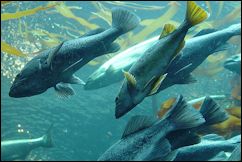 by Steve HanerNine states, including Virginia, have agreed to establish a major compensation fund to pay their private commercial and recreational fishing companies for damages caused by offshore wind turbines.
by Steve HanerNine states, including Virginia, have agreed to establish a major compensation fund to pay their private commercial and recreational fishing companies for damages caused by offshore wind turbines.
Three guesses where the money comes from. The announcement, made December 12, hints at it coming from project developers, but in Virginia of course that is a monopoly utility guaranteed by law to collect all costs from its customers. Dominion Energy Virginia’s planned 176-turbine Coastal Virginia Offshore Wind (CVOW) just got more expensive. In other cases and other states, also expect the bill to end up with energy consumers or taxpayers.
If the worst fears over CVOW’s impact on commercial fishing prove correct, a shrinking supply of seafood from the continental shelf will likely raise the prices on what is still coming to stores and restaurants. People may pay more both ways.
In a move very reminiscent of how Europe operates, this effort comes under the umbrella of a non-governmental organization, or NGO. The industry and wind advocates dominate it, and questions about just what authority the federal government has to impose this (none) are sidestepped.
A ream of documents was released, including this news release, a scoping document on the issue, and information on how to file industry or public comments by the end of January. It is officially a request for information (RFI) process and may be followed by a request for proposals (RFP) to hire a fulltime regional fund administrator to manage the pot of money and process claims for decades to come. The RFI notes:
As a reminder, this RFI is focused on the management of funds, not the source of funds. Therefore, the questions the States encourage respondents to focus on include the following: How might States encourage developers’ participation in directing their compensatory mitigation to a regional fund? What mechanisms or procedures should be established to ensure administrative costs are kept at a fair but reasonable level? How should administrative costs be paid?
Apparently in meetings so far, and this all started in June of 2021, the fishing industry has been quite explicit in its concerns, also outlined in the documents. The following bullet points are collapsed into paragraphs to save space:
Potential lost revenue due to: • Displacement from a fishing area • Surveys of the lease or project areas • Pre-construction • During construction • Post construction (operations and maintenance) • Decommissioning • Up or downstream effects to shoreside fishing businesses • Transition from highly productive to less productive fishing ground • Reduced catch in lease areas • Devaluation of fishing business (vessel, shoreside, etc.) • Permit devaluation.
Potential increased costs due to: • Need to acquire new or modified gear • Need to acquire new or modified navigation equipment (e.g., radar) • Increased fishing effort (i.e., slower towing in an array, more time to haul traps within an array, etc.) • Transit time/cost around arrays or to new fishing areas • Increases in insurance costs • Dockage and offloading fees, as there is potential for competition for limited space in ports and harbors to increase.
No estimate of cost, initial or long term, is included anywhere. With that list, the phrase “blank check” comes to mind. Supporters of the proposal claim that the main focus will be on preventing impacts by working with industry on siting and operating rules.
Although compensation is the last step to consider regarding this mitigation hierarchy, the States agree that the availability of this option is vital to ensuring coexistence of robust and dynamic OSW energy and fishing industries. Experience to date with siting and development of OSW energy in the region indicates that a standardized framework is necessary to ensure compensation in addressing aggregated adverse economic effects on fisheries equitably and efficiently.
As with the concerns over the endangered right whale, it is not this or that individual wind project but the accumulated mass of windfarms up and down the entire East Coast, thousands of planned towers, which causes concerns. They are especially concentrated in the fish-rich waters of New England.
Former Virginia Governor Ralph Northam (D) signed a June 2021 letter to President Joe Biden endorsing his call for 30 gigawatts or more of offshore wind, but raising concerns about damage to the fishing industry. Once he became governor, Glenn Youngkin (R) also sent a letter to federal authorities on behalf of the fishing industry, including expressions of his strong support for the Dominion project. Virginia Mercury did a story at the time on industry concerns.
Discussions among the states, federal regulators and the industry about creating a compensation fund and a bureaucracy to administer claims reportedly started this summer, with the Youngkin Administration participating.
Unlike the whales and other large marine mammals, supersensitive to sounds and killed by boat collisions, commercial fishing stocks will probably thrive around the turbines. But every new project will make tens or hundreds of square miles of ocean off limits to commercial fishing. The documents note that active proposals now total 43 gigawatts, and the industry is just now looking at sites in the Gulf of Maine.

Leave a Reply
You must be logged in to post a comment.